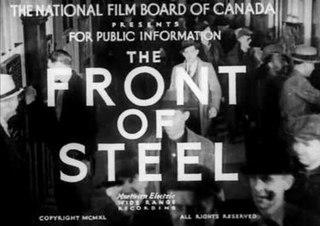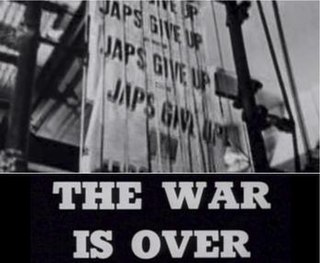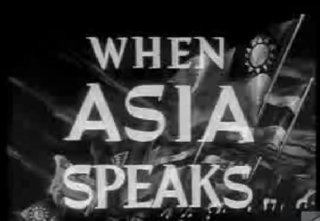
Now – The Peace is a film produced and directed in 1945 by Stuart Legg for the National Film Board of Canada series The World in Action, with unaccredited narration by Lorne Greene. Over its nearly 21-minute running time, circumstances during the immediate postwar period following the Second World War, leading to the formation of the United Nations are discussed.

Screaming Jets is an 11-minute 1951 Canadian documentary film, made by the National Film Board of Canada (NFB) as part of the postwar Canada Carries On series. The film, directed by Jack Olsen and produced by Sydney Newman, depicted the contemporary Canadian and international aircraft in production and on the drawing boards. The film's French version title is Avions à réaction.

The Front of Steel is an 11-minute 1940 Canadian documentary film, made by the National Film Board of Canada (NFB) as part of the wartime Canada Carries On series. The film, directed by John McDougall and produced by Stuart Legg, is an account of the value of steel in war production in Canada during the Second World War.

Industrial Canada is a 1958 18-minute Canadian short National Film Board of Canada (NFB) documentary film produced, directed and edited by Guy L. Coté for the Canadian Broadcasting Corporation (CBC) television series, as part of the postwar Canada Carries On series. Industrial Canada documents the industrial development of Canada during the mid-1950s. The film's French version title is Le Canada industriel.

The War Is Over is a 1945 five-minute Canadian short newsreel produced by the National Film Board of Canada (NFB). The War Is Over documents the end of the Second World War. The French version of the film is titled La guerre est finie.

The Battle for Oil is a 19-minute 1942 Canadian documentary film, made by the National Film Board of Canada (NFB) as part of the wartime Canada Carries On series. The film was produced by Raymond Spottiswoode and directed and edited by Stuart Legg.The Battle for Oil describes the strategic value of oil in modern warfare. The film's French version title was La Bataille du pétrole.

The Gates of Italy is a 21-minute 1943 Canadian documentary film, made by the National Film Board of Canada as part of both the wartime Canada Carries On and The World in Action series. The film was written, directed and produced by Stuart Legg and Tom Daly. The Gates of Italy describes the last days of Benito Mussolini's rule over Italy in 1943 during the Second World War.

Trans-Canada Express is a 20-minute 1944 Canadian documentary film, made by the National Film Board of Canada (NFB) as part of the World War II Canada Carries On series. The film was produced by Sydney Newman and directed by Stanley Hawes. Trans-Canada Express documents the importance of the railroad in Canada, emphasizing the use of rail transport during World War II. The film's French version title is D'un océan à l'autre.

Back to Jobs is a nine-minute 1945 Canadian documentary film, made by the National Film Board of Canada (NFB) as part of the postwar Canada Carries On series. The film describes soldiers in the Second World War returning home and back to a civilian life. The French version title of Back to Jobs is Nos soldats reviennent .

The Voice of Action is a 16-minute 1942 Canadian documentary film, directed by James Beveridge and produced by Raymond Spottiswoode. The short film was made by the National Film Board of Canada (NFB) as part of the wartime Canada Carries On series. The Voice of Action describes the importance of the Canadian Broadcasting Corporation (CBC) in the Second World War. The French version title of The Voice of Action is Dynamisme des ondes.

The War for Men's Minds is a 21-minute 1943 Canadian documentary film, made by the National Film Board of Canada (NFB) as part of the wartime The World in Action series. The film was produced by Stuart Legg. The film describes the impact of propaganda from the Axis powers in 1943, during the Second World War. The French version title is À la conquête de l'esprit humain.

Food - Weapon of Conquest is a 22-minute 1941 Canadian documentary film, made by the National Film Board of Canada (NFB) as part of the wartime Canada Carries On series. The film was written, directed and produced by Stuart Legg. Food - Weapon of Conquest shows the food shortage in Nazi-occupied countries in the Second World War, contrasted with the Allied response to the global food crisis. The film's French version title is Une armée marche sur son estomac.

Pincer on Axis Europe is a 20-minute 1943 Canadian documentary film, made by the National Film Board of Canada as part of the wartime Canada Carries On series. The film describes the Allied invasion of North Africa in 1942 during the Second World War.

Bombing the Nazis is a 10-minute 1943 Canadian documentary film, made by the National Film Board of Canada (NFB) as part of the World War II newsreels shown at theatres in Canada and abroad. The film describes the Allied air war over Europe during the Second World War, concentrating on attacks in 1942 and 1943 on an automobile factory in Vichy France.

When Asia Speaks is a 19-minute film produced in 1944 by Stuart Legg and directed by Gordon Weisenborn for the National Film Board of Canada series The World in Action. The film is narrated by broadcaster Lorne Greene. When Asia Speaks describes the disparity between the riches of Asia and the poverty of the masses during the Second World War that have led to nationalist movements in Asia. The film's French version title is Le Réveil de l'Asie.

Headline Hunters is an 11-minute 1945 Canadian documentary film, part of the wartime Canada Carries On series, produced by Alan Field. The short film was made by the National Film Board of Canada. The film was a tribute to Canadian war correspondents who reported from the front lines in the Second World War.

Gateway to Asia is a 10-minute 1945 Canadian documentary film, directed and produced by Tom Daly for the National Film Board of Canada (NFB) as part of the wartime Canada Carries On series. The film documents the importance of British Columbia during the Second World War as a "gateway" to Asia and the Pacific. The French version of Gateway to Asia is Au seuil du Pacifique.

Zero Hour is a 22-minute 1944 Canadian documentary film, made by the National Film Board of Canada (NFB) as part of both the wartime Canada Carries On and The World in Action series. The film was produced by Stuart Legg. Zero Hour describes the Axis and Allied invasions that have taken place during the Second World War.

Tomorrow's World is a 20-minute 1943 Canadian documentary film, made by the National Film Board of Canada (NFB) as part of the wartime Canada Carries On series. The film, produced by Raymond Spottiswoode, described the importance of conservation and rationing during the Second World War, and how the world would be more prosperous and better planned because of the war efforts. The French version of Tomorrow's World is titled Le Monde de demain.

The Battle of the Harvests is an 18-minute 1942 Canadian documentary film, made by the National Film Board of Canada (NFB) as part of the wartime Canada Carries On series. The film was produced by James Beveridge and directed by Stanley Jackson, who also provided the narration. The Battle of the Harvests shows how the farmers were mobilized worldwide in a battle on the farmland to serve the fighting nations during the Second World War. The film's French version title was La Bataille des récoltes.




















